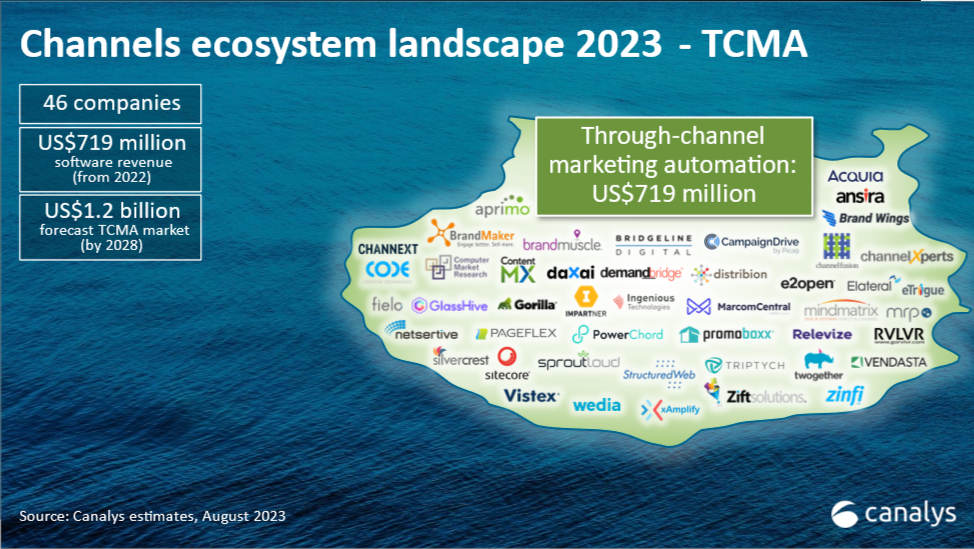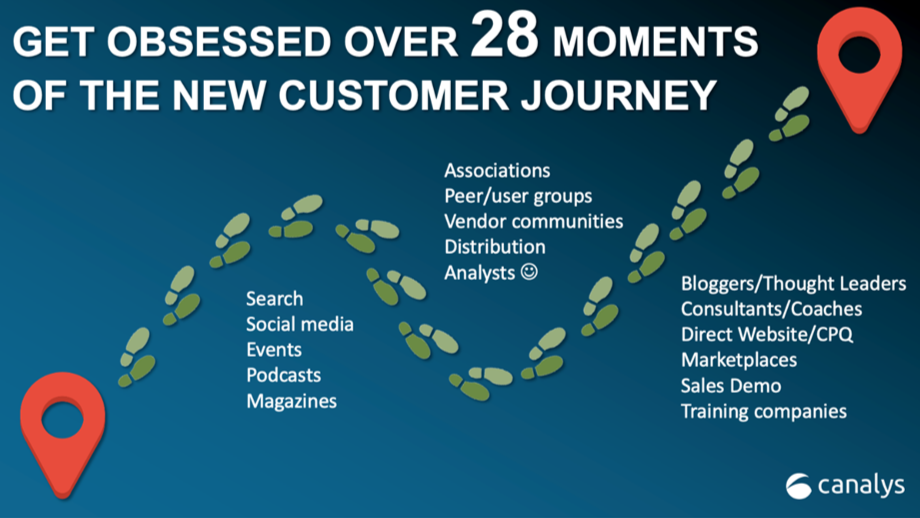The changing customer journey
The average customer now trusts seven partners across the entire customer journey including before, during, and after the transaction. The ability to monitor, measure, and manage these moments is now critical for channel professionals in the post-cookie era.
Partners have always played an important role throughout a customer’s lifecycle, but we only recognized (and paid) them at the point of sale. From driving market awareness (getting the customer to the dance) to closing the deal (getting them on the dance floor) to net retention/renewal (keeping them dancing all night long) partners are playing an increasingly important role.
The modern buyer experiences 28 moments (on average) that lead them to a purchase decision and vendor selection. Many of those moments are with or through third-party partners, marketplaces, thought leaders or influencers with specialized knowledge and expertise.
This expanding customer journey means no single vendor can effectively reach and engage their target markets alone. It is a team sport! Vendors must invest in collaborative go-to-market strategies with their partner ecosystems, specifically around co-marketing and co-selling. Through-Channel Marketing Automation (TCMA) platforms are pivotal to scaling and automating co-marketing capabilities, enabling vendors and partners to effectively surround the modern buyer and drive new business. TCMA platforms offer enhanced and automated capabilities for “to, through, and with” partner marketing and are changing the way vendors engage with mature and digitally-savvy customers by enabling personalized marketing across the 28 moments to vendor selection.
TCMA fits in a stack of other technologies in the post cookie world. Moving from third-party data (buying these early customer moments from Google and Facebook) to second-party data (shared by partners who are creating the moments) requires advanced levels of B2B attribution, data mapping and account matching, deal and lead registration systems, and through- and with-channel marketing.
What is a Through-Channel Marketing Automation Platform (TCMA)?
TCMA platforms are designed to streamline and automate "to, through, and with" partner marketing efforts. They provide a centralized repository of marketing content, campaigns and tools to help partners more easily generate interest, engagement and sales with end customers. TCMAs typically offer strong content personalization and syndication, MDF management, co-branded assets, personalized content generation, and campaign creation and management features. Other features include analytics and reporting, lead generation and lead management tools, general sales and marketing resources, multi-channel marketing plans, templates, integrations with other systems, and easy to follow co-marketing processes and templates.
For vendors, TCMA platforms ensure their messaging and marketing efforts are ever-present and resonate effectively with their target audience. Additionally, by providing partners with streamlined access to marketing resources and tools, vendors can scale their marketing efforts more efficiently. The integration of AI and automation saves significant time and ensures a more consistent and effective representation of their branding and messaging across diverse markets and audiences. These tools also extend a vendor’s reach, budget, and impact far beyond what they could reach on their own; vendors can reach a broader audience with tailored, personalized content and marketing tactics all driven by their customers’ trusted partners.
For partners, TCMA platforms enable teams with the resources to be successful, simplify through-marketing and co-marketing initiatives, and optimize partners’ limited sales and marketing resources. They provide access to ready-to-use, customizable marketing materials, campaign templates and tools to drive sales and marketing initiatives. Armed with better content and tools, partners can operate more efficiently and effectively. This efficiency not only translates into increased sales opportunities but also fosters greater alignment with vendors. Sophisticated campaign management, content generation and analytics in TCMAs empower partners to enhance marketing effectiveness and build more meaningful relationships with customers long term.
The TCMA landscape
According to Canalys research, the broader ecosystem software industry boasts 233 active companies, generating US$5.3 billion in revenue. This number is projected to jump more than two-fold to US$11.8 billion by 2028 as more companies put an emphasis on data-driven ecosystem strategies.
In 2023, there were 46 players in the Through-Channel Marketing Automation segment that delivered US$719 million in revenue, which is expected to swell to US$1.2 billion in 2028. No one-size-fits-all TCMA exists. Each platform has its own unique strengths, focuses, and best fit go-to-market strategies. This includes partner marketing across different industries, geographies, market segments, products, business models, and buyer roles.

TCMAs are evolving and the race is on for these players to differentiate through innovations, such as integrating AI to further automate various marketing activities. Choosing the right TCMA depends on specific business needs, the size and nature of the partner network, ease of use by their partners, and integration requirements with existing systems. This is why there are so many capable vendors in this space
Key TCMA players
- Acquia (Boston, Massachusetts, USA): Acquia is a Digital Experience Platform (DXP) provider that specializes in Drupal and other open-source applications. It offers marketing automation, content management, commerce, and personalization tools to help businesses engage with customers.
- Ansira (St. Louis, Missouri, USA): Ansira is a marketing agency which leverages its marketing automation platform, Edge, to drive compliant local brand campaigns. Delivers a powerful one-two punch for serving vendors in different industries.
- Aprimo (Chicago, Illinois, USA): Aprimo is a marketing operations software company that provides campaign planning, content creation, and asset management solutions to help organizations plan, budget, and execute marketing strategies.
- BrandMuscle (Chicago, Illinois, USA): BrandMuscle combines channel marketing and management with powerful incentive strategies, giving a boost to local and channel partner marketing efforts.
- Brand Wings (Chicago, Illinois, USA): Brand Wings is a brand management platform provider that works with a wide variety of ecosystem members such as resellers, retailers, distributors, agents, and brokers, among others. Its focus is in automating the creation and management of branded or co-branded marketing assets.
- BrandMaker [by Uptempo] (Karlsuhe, Baden-Württemberg, Germany): Uptempo provides a unified marketing operations platform, formed through the combination of three disparate platforms: Allocadia, BrandMaker, and Hive9. Its specialties are in automating creative workflows, digital asset management, budget and financial management, and data-driven insights.
- Bridgeline Digital [Unbound is marketing] (Burlington, Massachusetts, USA): Bridgeline Digital’s marketing automation platform, Unbound, helps organizations with eCommerce management, email marketing, site content, and customer relationship management.
- CampaignDrive [by PICA9] (New York, NY, USA): CampaignDrive is a local marketing platform that helps organizations create and manage localized marketing assets. It also has a local usage reporting functionality that determines the value of each brand asset created.
- Channel Fusion (Hiawatha, Iowa, USA): Channel Fusion’s marketing operations platform, Digital Fusion, has a distinct focus in supporting distributors. Its marketing automation functions features tools such as Ad Builder, Asset Library, and Merchandising and Point of Sale solutions.
- ChannelXperts (Karlsuhe, Baden-Württemberg, Germany): ChannelXperts is a SaaS-based PRM company with an expansive portfolio of solutions including, partner onboarding, marketing automation, sales management, and service automation, among others.
- CHANNEXT (Utrecht, the Netherlands): CHANNEXT’s Partner Marketing Platform automates partner marketing and sales efforts. It enables organizations to segment and manage partners, automate partner marketing, identify leads, and track partner performances.
- CODE [now RAPP group] (New York, New York, USA): CODE is the data and technology division of RAPP Group, a global creative agency, and its platform offers five broad marketing services: digital strategy and technology consultancy, data engineering and digital identity, marketing science, customer experience management, and marketing technology.
- Computer Market Research (Las Vegas, Nevada, USA): Computer Market Research is a web-based channel management automation platform that provides several solutions, including channel data management, channel sales management, channel marketing management, and PRM.
- ContentMX (Newton, Massachusetts, USA): ContentMX is a platform designed to empower content marketing strategies. Its content marketplace platform equips partners with ready-made blog entries, email marketing, social media and social promotions.
- DataX (Bangkok, Krung Thep Maha Nakhon, Thailand): DataX is a data-driven platform that helps organizations with lead generation and closed loop marketing automation. Leveraging AI and analytics, it observes customer behaviors, identifies needs, and recommends products and solutions.
- DemandBridge (Hunt Valley, Maryland, USA): DemandBridge offers various technology solutions that enable distributors to properly service customers’ marketing and sales efforts. It not only offers automation for marketing, but also the distribution and sourcing of products.
- Distribion (Dallas, Texas, USA): Distribion’s Distributed Marketing Platform allows organizations to create automated cross-channel campaigns that partners can enroll in and customize to their preferences.
- E2open (Austin, Texas, USA): E2open is a supply chain management platform that offers a Channel Application Suite to engage partners and run effective incentive programs.
- Elateral [now Brandgility] (Fleet, Hampshire, England): Brandgility’s Brand Asset Management (BAM) platform helps companies safely store and enable their employees to build sales and marketing collateral through automation without the need for coding.
- eTrigue (San Jose, California, USA): eTrigue’s channel marketing platform is designed to accelerate lead generation. Using it, partners can identify target personas of their ideal prospects, run co-branded campaigns, and receive real-time leads.
- Fielo (Minneapolis, Minnesota, USA): FIelo is a marketing platform with a focus on incentives. Using it, organizations can design and deploy channel incentive programs, create customized marketing assets, and gauge partner performance incentive programs.
- GlassHive (Allen, Texas, USA): GlassHive is a marketing platform with a built in CRM feature. It offers tools like email builder, automated marketing planner, A/B testing, and collateral library.
- Gorilla [now WTCT] (New York, New York USA): Gorilla Group has rebranded under Wunderman Thompson Commerce & Technology, an end-to-end commerce agency. As a result, Gorilla’s Marketing Connector platform is now part of the WTCT technology portfolio, and it offers marketing automation solutions like email generation, market asset management, etc.
- Impartner (South Jordan, Utah, USA): Impartner PRM optimizes and accelerates partner ecosystems, partner marketing and partner lifecycles with a user-friendly UI and customizable tools. One of the largest players in the PRM market, hundreds of the top brands in technology and manufacturing trust Impartner with their partner programs.
- Ingenious Technologies (Berlin, Brandenburg, Germany): Ingenious Technologies is a comprehensive marketing management platform provider. It also features robust PRM capabilities like partner recruitment, onboarding, and performance tracking.
- MarcomCentral (Solana Beach, California, USA): MarcomCentral’s brand management and distributed marketing platform helps businesses manage and distribute marketing assets to their partners, track marketing activities, and provide data-driven insights into campaign performance.
- Market Resource Partners (Philadelphia, Pennsylvania, USA): Market Resource Partners’ MRPConnect platform automates the process of messaging target accounts, as well as providing customer insights, campaign management, and lead generation.
- MindMatrix (Pittsburgh, Pennsylvania): Mindmatrix’s Bridge platform features PRM functionality and marketing automation with tools for “to, through, and with”, and for-partner marketing. This is a unique and capable platform that connects direct selling, channel, and marketing into one platform with great vendor feedback.
- Netsertive (Morrisville, North Carolina, USA): Netsertive’s Multi-Location Experience (MLX) platform is designed to automate digital marketing initiatives for multi-location marketers. It creates localized landing pages, deploys localized advertising campaigns, and provides marketing data.
- Pageflex (Marlborough, Massachusetts, USA): Pageflex’s marketing automation portal, Pando, allows users to personalize, customize, and localize print, email, cross-channel campaigns and marketing contents. It also provides co-branded asset creation, campaign collaboration, and performance tracking capabilities.
- PowerChord (St. Petersburg, Florida, USA): PowerChord is a custom acquisition platform that helps brands convert sales locally, streamline customer journeys, and communicate with customers leveraging data insights.
- Promoboxx (Boston, Massachusetts, USA): Promoboxx is a digital marketing platform with a distinct focus on enabling social media marketing for retailers. It automates local social media campaigns by providing customizable marketing assets, cadenced Facebook posting, and MDF management.
- Relevize (Austin, Texas, USA): Relevize is a revenue management platform that automates demand generation campaigns to help partners acquire new leads.
- RVLVR (San Diego, California, USA): RVLVR is a comprehensive TCMA platform that enhances "to, through, and with" channel marketing campaigns through partner marketing concierge services, sales and partner enablement programs, data guidance and integration, agency creative and digital marketing execution, and customer outcall and partner mentoring services.
- Silvercrest (Palm Springs, California, USA): Silvercrest’s Local Marketing Automation Platform, LMap, has built-in programmatic rules that help retailers and agents create localized marketing content. It also tracks and stores phone numbers to be utilized for follow-ups.
- Sitecore (San Francisco, California, USA): Sitecore’s Experience Platform automates marketing campaigns and workflows, including email marketing, social media marketing, web personalization, and campaign management.
- SproutLoud (Sunrise, Florida, USA): SproutLoud is a distributed marketing platform that enables brand-to-local marketing, and it provides marketing resource management, marketing automation, and data-driven marketing insights. It leverages AI to streamline partners to deploy and manage localized brand-compliant marketing campaigns.
- StructuredWeb (New York, New York, USA): StructuredWeb is a TCMA platform that streamlines channel data management, automates marketing operations, and improves partner visibility. It segments its marketing automation solutions by partner size. For example, fully managed and customized campaigns for larger strategic partners, and more standardized ready-made campaigns for smaller partners.
- Triptych (Eden Prairie, Minnesota, USA): Triptych is a sales enablement and marketing automation platform – purpose-built for healthcare, financial, and manufacturing industries. It has several featured modules, including asset management, business intelligence, co-op management, eCommerce, EDDM, and incentives.
- Twogether (Marlow, Buckinghamshire, England): Twogether’s Unified Channel Management platform combines PRM, marketing automation, and channel sales enablement features to help businesses streamline channel operations, improve partner engagement, and drive channel revenue growth.
- Vendasta (Saskatoon, Saskatchewan, Canada): Vedasta is an AI-driven SaaS-based PRM platform that combines marketing automation, financial management, and project management functionalities to help businesses manage local partners, dealers, and independent agents to deliver digital solutions to SMBs.
- Vistex (Hoffman Estates, Illinois, USA): Vistex is a revenue management software with PRM and TCMA capabilities. It is a well-known SAP extension, and also has the ability to integrate into any ERP platforms.
- Wedia (Paris, Île-de-France, France): Wedia is a Digital Asset Management (DAM) platform with PRM capabilities. It helps organizations manage and distribute marketing assets to partners, track partner marketing activities, and provide data-driven insights of marketing campaigns.
- xAmplify (Fyshwick, Canberra, Australia): xAmplify’s cloud based PRM platform offers advanced TCMA functionalities to help organizations automate and streamline lifecycle partner management processes.
- Zift Solutions (Cary, North Carolina, USA): Zift Solutions is a comprehensive Through-Channel Marketing Automation (TCMA) platform and PRM built to work as one. One of the largest and most powerful PRM’s, the new ZiftOne has hundreds of leading enterprise technology companies as customers.
- Zinfi (Pleasanton, California, USA): Zinfi’s Unified Channel Management platform features modules for Partner Relationship Management, Partner Marketing Management and Collaborative Workflow Management for different types of partners. Zinfi has dozens of large global technology companies as clients and boasts some of the deepest features and functionality among PRM companies.
Future of TCMA
TCMA platforms are quickly becoming smarter and more automated through AI and machine learning. AI enables these platforms to automate content generation and campaign execution tasks, such as personalized content creation, campaign execution, content and marketing recommendations, better lead scoring and customer journey mapping – leading to even more effective and efficient partner marketing.
Additionally, the technology ecosystem market is growing quickly and is likely to experience some market consolidation. Larger players may purchase smaller, niche solutions to create more robust platforms. This consolidation is expected to result in more robust and versatile TCMA platforms and ecosystem management platforms in general, offering a broader range of services and capabilities under a single umbrella.
Collaborative strategies will win
To best reach the modern buyer, vendors must invest in collaborative go-to-market strategies with their partner ecosystem. Co-marketing enables vendors to expand their reach, leverage strengths, provide more holistic solutions, and drive sustainable growth. Therefore, TCMA is poised for a shift to holistic TPMA (Through-Partner Marketing Automation).
TPMA platforms will not just automate to-, through-, and with-partner marketing at scale, but also enable collaborative go-to-market motions across a diverse ecosystem of non-traditional partners including, affiliates, affinities, advocates, ambassadors, and B2B influencers.




